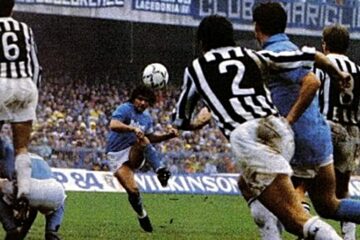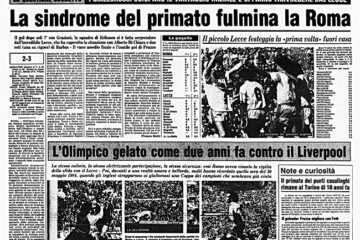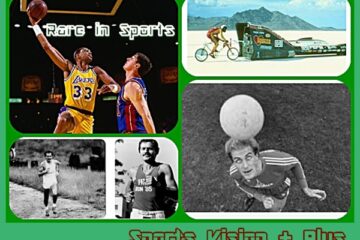The Corinthian Democracy of Dr. Socrates!

Sócrates Brasileiro Sampaio de Souza Vieira de Oliveira
PROLOGUE!
Medicine, philosophy, freedom. He was convinced that democracy was a category of sports as well and his team, “Democracy”, was even wrote it on their chest during the dictatorship.
This is the story of Socrates, the doctor who knew how to cure Brazil, but not himself.
When in 1981 the Poland of Lechia, Valenza and John Paul II was bent by the military coup to return to being the communist Poland of General Jaruzelski, all the arrested leaders of Solidarnosc, the first autonomous union that had ever managed to be born in a country of the Soviet bloc, decided not to cut their beards anymore.
Every time someone published an image of them, every time a leader of the regime met them, they, without opening a mouth increasingly hidden by a carelessness that was instead a gesture of love, would silently shout one thing only that, as the national anthem says, Poland is not dead as long as we live.
Who knows why the first intellectuals in history, who are the men of Mediterranean Ancient World, are often carved in marble with long beards and spacious foreheads. I say who knows, but here too the message is obvious. What you see is a man who used his brain more than his jaw.
Almost as if it were unpalatable to eat, almost as if it were something for poor people, to taste the flavors and maybe share them together with a table of friends. This thing instead needs to be said. Nothing can contrast brain and jaw.
First of all because if they are on the same head there must be a reason and then because I have never seen someone living on ideas alone, even if someone who lives on jaw alone is less rare. However, I repeat, it makes no sense to say that it is a man, rather than that man must only be a library or a refrigerator. Extremes do not get us far. Here, while the marble takes the shape of that beard and that hair, ancient world, among the many marked by two figures, we are between the V and IV centuries BC.
Then we say ancient world, in reality we are talking about a place of ours because we are all children of this land. I was saying between the 4th and 5th century BC in that land of Socrates and Hippocrates live, think and I must add also operate.
I say operate because Hippocrates is the founder of medicine as we know it. Son of an aristocratic family, his father was also a doctor, so much so that he, the father of Hippocrates, boasted of being a descendant of Asclepius, the god of medicine.
In Christianity there is a god who becomes man, for the ancient world and Romans instead the divinities were already very human in themselves, so much so as to rejoice, get angry, even leave a few children here and there, conceived for a distraction, a deception or a passing intoxication.
And then there was a deity for every need. However, apart from Hippocrates, there was Socrates, and Socrates is made of another stuff because he is considered the founder of ethics and philosophy, and he addresses every issue with the tool of dialogue.
And if you say dialogue, it is because before dialogue there is obviously thought.
However, we must not get distracted because ours is not a story of ancient World, but it is a story that starts from there to then make us cross the sea.
And not only the Mediterranean, also that sea that would have been crossed by Columbus two thousand years after Socrates. We must arrive in Brazil in a city in the north called Belhem.
I
Here in 1948 arrives a Maronite Christian family who fled after a bombing in the north of Israel, another region that really, like Mediterranean countries, has marked the history of man. The father of our protagonist is one of those people who did not have the time and money to study, but the desire was there and how.
And now here in Brazil he is self-taught and while he brings children into the world he reads everything he can of philosophy. Back in the ancient time, in the state of Athens the philosophers were sculpted in marble, he instead in the names of his children. One he will call Sophocles, one Sostenes, another Socrates.
Socrates, Brasiliero, Sampaio de Sousa, Vieira de Oliveira because it is he we are talking about.
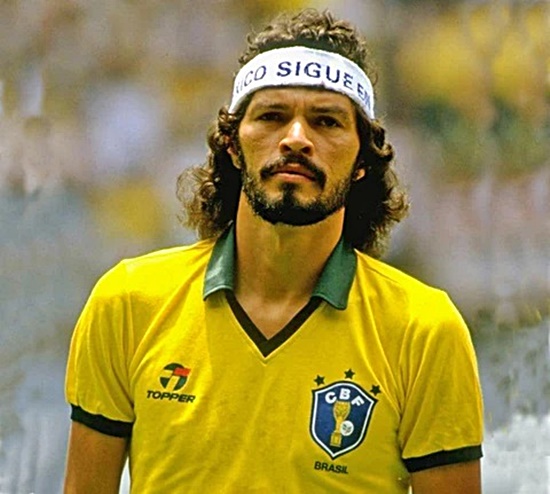
Of Socrates, the captain of Brazil at the World Cup in Mexico 86 but above all of Spain 82. A perfect team, that depending on the points of view you could only admire or fear. They never went into apnea and even if the game went badly, they continued to play their football harmonious and danced with the calm of the strongest and in the end, they were always right because in sport the strongest are always right.
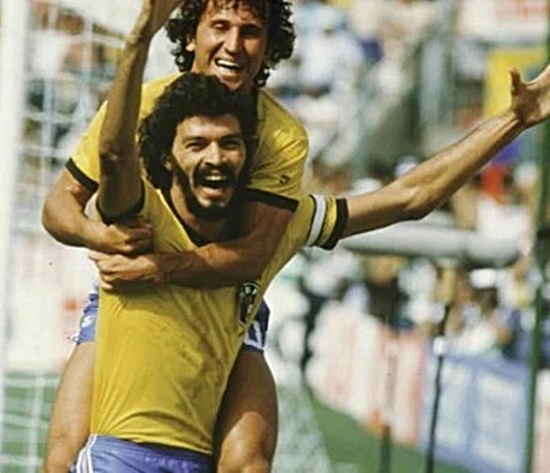
Except that even the strongest had their weak points and in that 1982 team the center forward Careca, who would later make Napoli’s fortune together with Maradona, had gotten injured before the World Cup. He was replaced by a useless Serginho.
In goal instead there was a certain Valdir Pérez who, having it in front of him, Zico, Falcao, Eder, Junior evidently thought they were always in the theater and for this is not that they were very focused on the position between the posts. But it was not a huge problem for that Brazil, strangely convinced that we Brazilians would always score one goal more than the others.
Then at the World Cup in Spain it happened that on the road arrived in an Italy apparently subdued. Bearzot knew it and Paolo Rossi showed it that there was a great presumption in that eleven that played with nine but that still caused a great fear. Socrates also scored the goal of 1-1 in that match that however Italy won by one goal more, 3-2. The dream team returned home, and Italians took the elevator to the Cup.
Socrates was a strange player, for him the problem was not so much the victory but the team. To put it in Machiavelli’s terms, the end of the victory did not justify the means to achieve it, and Socrates thought that the perfect team was the democratic one.
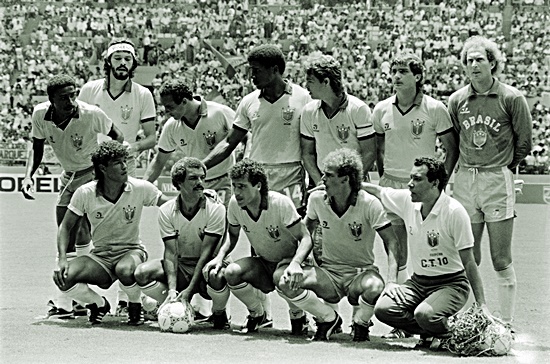
Yes, the democratic team because only the involvement of everyone in the choices, only the full responsibility of the athletes would have allowed the perfect victory. It is not easy to explain because it seems crazy and perhaps the idea of applying political criteria to sport is, but Socrates had this in mind.
A victory without democracy was like a dish without salt and the beauty is that Socrates democracy, or rather Corinthian democracy little by little really set it up. A team where everyone, or better yet where everyone together decided everything. Now, however, we should ask ourselves what democracy is and inevitably we find ourselves back in ancient Greece.
That democracy that we learned to frequent only after the French revolution in Greece had blossomed more or less two thousand years earlier. In Athens they started from the principle that the sovereign of the people was the people themselves, for this reason here every citizen had the possibility of proposing and voting on laws.
But let’s stay with the young Socrates who, as mentioned, grows up in a house overflowing with books and this means two things. The first is that the father will do everything so that his children can complete those studies that were denied to him.
The second is that you get to a military dictatorship and in Brazil it happens in 1964 this can be a problem because it is true that the regime in Brazil will never be like the one in Chile or like Stroessner’s Paraguay but if they find you at home with certain texts you get into a big problem. Only those who love books know what it means to lose one.
II.
In there is not only the story you read, now there is also your story, an underlining, a photo of an old love placed there to lose it without throwing it away, an idea that you thought was yours and that instead you read here who knows how long ago.
In short, you can imagine the toil and suffering of this father of a family who now has to explain to Sophocles, Sostenes and Socrates that now thought is dangerous. And so, you decide to make a small dramatic gesture and burn before the eyes of your children who bear the names of Greek thinkers a book on the Bolshevik revolution.
Socrates is ten years old, but the effect on him will not be the one hoped for. Now it would be easy to tell the story of the boy who grows up divided between football and studying but it would also be a banality and Socrates, a banality, does not even know how to write, he studies a lot and while he plays football, he even attends university. He took medicine which is not a faculty like the others because if you then have to put your hands on a man who is sick you also have to have an immediate answer.
You have to reason and intuit with great speed. Speed is everything in medicine and in sports but if you want to cure people you have to know that all the science you know must be in your brain not in your books.
All this however does not scare Socrates. You learned as a child that you can lose a book but not the one that taught you. He will also get a degree for everyone he will inevitably be a doctor. Now we said that all the thinkers of ancient Greece are presented to us with the same image, with that long beard and that spacious forehead.
Socrates, who is a bit of the philosopher in his name, a bit of the Hippocrates of medicine that he studied, does not escape this cliché even if his beard is more reminiscent of Ernesto Cechevara’s. A beard that frames a face, that one that seems sculpted in marble and that has the same elasticity as marble.
His expressions are two with and without the ball. Yes, because Socrates plays in the center of the field. The game must necessarily pass through his feet. The problem is that if medicine taught him speed on the field, things don’t go exactly like that. His detractors say that he runs little, is lazy, that as soon as he leaves training, he grabs a cigarette and downs a glass of beer. In short, they say he has few rules and many thoughts that then become vices.
All his genius and all his recklessness soon end up in the service of Corinthians. It really seems like destiny. Every choice, every stage of this man’s life leads back here, to Greece. Corinthians means precisely this team of the inhabitants of Corinth.
III.
Even though the club’s founders had in mind something much more than the city that stands on that thin strip of land that prevents the Ponnesus peninsula from being an island. It all happened in 1910 in San Paolo, Brazil. The idea is from a group of workers and laborers who arrived here from Portugal, Italy and Spain.
They want to find a sports club for the less fortunate kids in the city, who are many, many. In short, a team that has the last ones, the underprivileged, but not the defeated in its DNA. The name is inspired by an English club, the Corinthian Football Club, which doesn’t even exist anymore today.
But why does Corinth exercise all this fascination first on the English and then also collapsed here in Sao Paulo in Brazil? Well, in reality if we talk about Saint Paul as the saint and Corinth the connection is easy because the two letters to the Corinthians are among the most quoted in the New Testament.
The most famous passage is the hymn to charity that we often hear at weddings without listening. It covers everything, believes everything, hopes everything, endures everything. Charity will never end. Now you must imagine that these words are addressed to a society that does not seem to have been exactly a circle of schoolgirls. In the first century after Christ Corinth was a Roman colony and a center of Greek culture.
Here they faced each other and encountered currents of thought and religion that were very different from each other. The result, as always when very different things are mixed without giving them a direction, was a certain laxity of customs and Saint Paul, who knew well that the principal had said that it is not the healthy but the sick who need a doctor, had rushed here. And here he had remained a year and a half.
Now it must be said that Paul was indeed a holy man, very holy, but it does not seem that he was a monster of sympathy. He was obviously very little inclined to compromise and for this reason in Rome he would have also lost his head, but he was a very great preacher also because he had the rare ability to put his cunning at the service of his intelligence.
And cunning and intelligence had suggested to him that by laying the foundations here in the port of this Corinth, lost and disoriented, what he would tell and announce would travel well beyond his voice.
Ports are like that; they echo especially if behind them they have a lost city. But there is something else to add about Corinth. This time it concerns sports. Let’s say right away that there is no match, it is the case to say so, there is no match with the city of Olympia but also Corinth since the sixth century BC organizes its sports competitions.
If there the games can only be called Olympic, here since we are on Anisthmus, a strip of land that connects the Peloponnese to the continent, the competitions will be the Isthmian games. It is a great celebration in honor of Poseidon, God of the sea, with gymnastic competitions, wrestling, horse races.
The winner received a crown not of olive, like Olympia, but of pine needles and here too we understand why the other games were more popular. However, do not think that they were games just for the sake of… absolutely not. They were held every two years, they lasted for days and days and if the competitions overlapped with a war, it was the war that was interrupted, not the challenges.
Not like ours with the Olympic boycotts, because no one, not even the enemy populations, had to be missing. And then the stadium. Think that in the fifth century, always before Christ, a new one was built. The shape was not like that of our stadiums. Imagine then a river wide enough and old enough to have dug a deep furrow with its flow. There, a river like that really passed through Corinth. And then to build the stands we leaned on its banks, while the bed was leveled to obtain the track for the running trials. And the water?
The water was even channeled into an artificial underground riverbed, no small thing, and it was observing this stadium and these games and Saint Paul, who had not missed because of the importance of sports and to explain the things he had in mind, wrote these words in the letter addressed precisely to the Corinthians. Do you not know that in a race in a stadium all the runners run, but only one wins the prize. You also run in such a way as to win it. But every athlete is temperate in everything. They do it to obtain a perishable crown, but we can incorruptible.
So, I run, but not like someone without a goal. I box, but not like someone beating the air, rather I treat my body harshly and drag it into slavery, so that after having preached to others I myself will not be disqualified. It seems like listening to football minute by minute and instead he listens, yes fassina.
Here, Socrates feeds on all this, on sport, on history, on democracy, on religion, on medicine. In any case, Corinthians really seems like the perfect team for such a man, also because in ancient Corinth, I almost forgot, there was also the temple of the god Asclepius, yes, the god of medicine, the one of whom Hippocrates’ father boasted of being a descendant.
In short, everything makes sense, except that Brazil with the general in government is a thousand miles away from Athenian democracy and he, the doctor, always has that beard on his chin that is more like a Chekhovian than a philosopher and his revolution begins on the football pitch, more on the training pitch of his club.
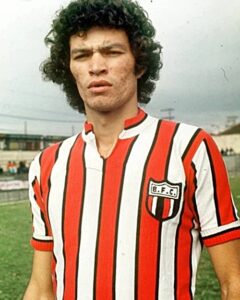
IV.
It is 1978, Socrates is just 24 years old when in the Corinthians locker room sort of self-management of the club takes shape. For the first time in the world of sport, rules are applied that, perhaps, we could even go as far as to define as socialist, I don’t know. And in reality, they are democratic rules, even if the idea of combining democracy with sport to the condition of a club really seems absurd. I say democratic rules because socialism, or rather, real socialism, we know, is something else. Ask the long beards of Solidarnosc, the tanks of General Jaruzelski.
In any case, never in any other team, in any other sport, in any other part of the world has the hierarchical principle that is the basis of every locker room and every club ever been overturned. Not even in the Soviet Union has it ever happened. Indeed, in the country of real socialism, control, the hierarchization of clubs was the norm, starting with the fact that there was the police team, the army team and even the toy team of some bigwigs of the regime.
But let’s stay with Corinthians. What has started is not the game of a week. They will call it Corinthian democracy because from now on here the decisions will not be made by the president, nor by the coach.
Decisions are made by everyone together. They discuss and then vote. It starts with the time of meals, Socrates will tell. Three different solutions were proposed which then had to be voted on and the choice of the majority was accepted. No problems ever arose. Then we get to the pre-match retreat, a symbol of oppression and the de-responsibilities of every dictatorship.
Its purpose is to humiliate people. It’s like saying you’re worthless, you’re irresponsible, you have to be kept under control, but the better one is, the better one plays. The highest moment of Corinthian democracy would come four years later, in 1982.
The team that abolished the dictatorship, that votes on mealtimes and match tactics wins the state championship, but it is not so much the victory that causes a stir, it is the T-shirt, a writing stands out. No, it is not a sponsor, it is an idea. It is not a drink; it is a desire. Because if it is true that advertising ignites a need and then satisfies it, the word with which Corinthians plays the championship does not ask to be consumed and then abandoned like an empty can.
Corinthians won the championship with the word democracy printed on their T-shirts. It is a gesture that leaves everyone speechless, including the military junta which is now clearly already wavering and does not have the strength to oppose it.
Only the doctor and his team are not satisfied with playing with this hymn not to charity but to freedom printed on their shirts. Socrates and his team thought of printing the written one backwards, precisely to affirm a necessity and a denial, a desire and an absence. And all the game numbers are also printed backwards.
The only that also remains the same backwards is that eight that Socrates himself has always had on his shoulders. The doctor will explain years later. It was probably the most perfect moment of my life and I’m sure it was for 95% of my teammates too.
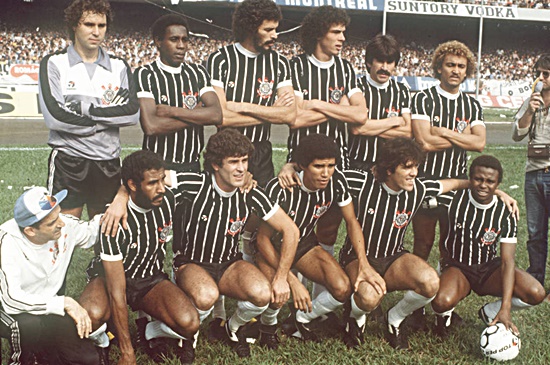
But do you think how beautiful football was not so many years ago? A football in which there was the freedom and pride to present oneself for what one was and for what one believed in. A football that, yes, already gave a lot of money to its actors but that also gave the possibility to go beyond money. But don’t think that Socrates refuses money and that he only plays in the service of an idea.
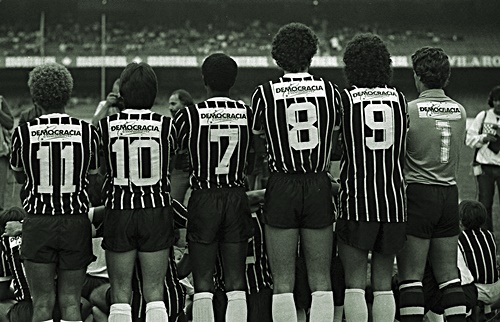
The fact is that while he earns, he continues to ask himself those questions that no other footballer in his golden cotton wool wants to ask himself. And so, a few months after the championship won with that revolutionary writing on the shirt, Corinthian democracy raises the bar. And in November of the same 1982 the team takes to the field with another writing.
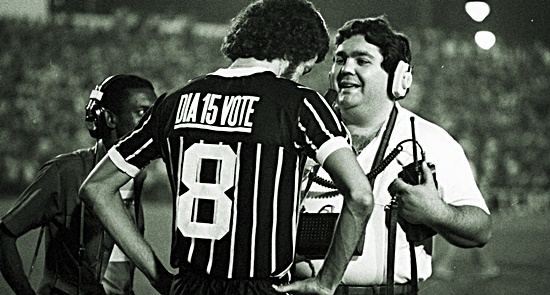
On the 15th go vote. These are the elections that would have opened the way to the democratization of Brazil. By now it is a crescendo. Two years later Socrates, who is the captain of Brazil as well as a political reference for millions of Brazilians, speaks in San Paolo in front of a million and a half people.
And he promises not to leave the country and Corinthians if the democratic election of the President of the Republic were re-established. In fact, Socrates has begun to evaluate the offers that arrive from abroad and that so far, he has refused. And in these days, one has also arrived from Fiorentina.
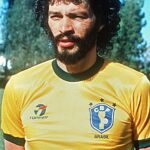
V.
It is 1984 and our championship is truly the Mecca of football because all the best in the world plays here starting with Maradona and Platini. The direct election of the President of the Republic does not pass and he, as promised, packs his bags. He leaves his favorite team, the team for which he will say:
“I would like to die on Sunday” and on the day that Corinthians wins the title”.
He arrives in Italy, but it is not a winning idea. It is that the image man of the team is Giancarlo Antognoni, but the leader, the true leader of the locker room is Daniel Passarella, Argentine central defender. One all talent and anger. A great player, there is no doubt about it, but there is no room for another personality so strong. And then they are an Argentine and a Brazilian…. We’ve said it all.
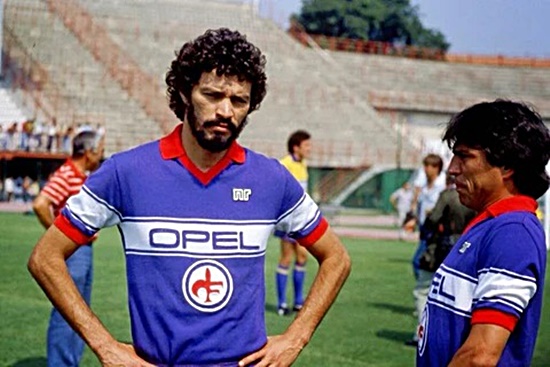
Even here some gossip pops up who whispers Socrates can’t give up beer and cigarettes. It’s true. Everyone knows it. But you can kill a person by telling the truth.
After only one year Socrates says goodbye to Fiorentina and returns to his Brazil. To some it may seem like a defeat, but that someone has evidently not understood what Socrates is made of. After he still will play for Santos and Flamengo, but in a few years his career ends. He will defend his medical degree; he will commentate matches on TV but unfortunately does not stop drinking and smoking. in 2011 he was hospitalized for the umpteenth time.
It’s not just cigarettes but alcohol bowed the stomach, and the liver. He will pass away on December 4, just 57 years old. Hats off to the death of the doctor, the footballer who wanted to win democratically. The footballer of the desire for democracy and its people that he carried on his shoulders and printed on his shirt.
Hats Off!
The day of his death. Corinthians salute him at the stadium with a minute of silence. Everyone, absolutely everyone, the team, the bench, the stands do not lower their heads but raise their fist to the sky. By the way, today is Sunday, the day when Socrates had hoped for the day of his farewell.

Really Corinthians, his Corinthians, wins the championship. A perfect happy ending for a story that doesn’t have much of a happy ending.
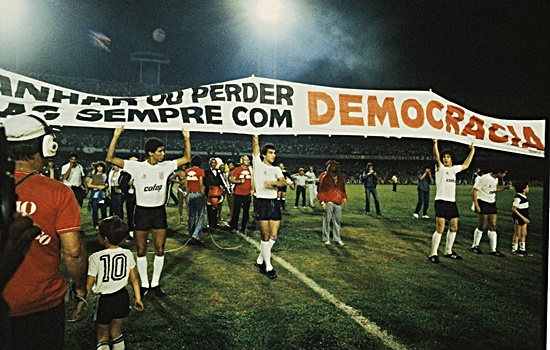
Giancarlo De Sisti who had trained him in Fiorentina, on this Sunday of sadness for the passing away of Socrates and celebration for his champion Corinthias, will say:
“he was an intelligent person who wanted to be inform on everything, a good politician, even if someone inside the team would call him a 68er for his ideas, but he was a man of substance and charisma. Once I told him: Have you seen what the newspapers say? He told me: “Yes, I read the newspapers, but only the political pages.
The sports part doesn’t interest me”.
Goodbye doctor and Thank You!!!
Translated to English by: Pjerin Bj | Exclusivity on this page holds the date on October 16, 2024.
All photos are taken from Google. If you have any issue on the photos, please let us know before making any reporting. Thank You!
_________________________________
Sports Vision + / The Hour of The Champions in activity since 2013
Source: Rai Radio: “I numeri primi” by Italian journalist F. Graziani
Discover more from Sports Vision +
Subscribe to get the latest posts sent to your email.


